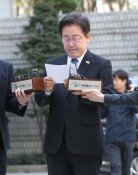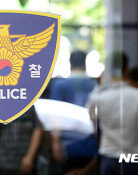If Korean president inspects Chinese military
If Korean president inspects Chinese military
Posted September. 03, 2015 00:18,
The opening scene of the Korean hit movie "Ode to My Father" was impressive. Massive crowds including the main characters family, demand their rescue to a U.S. naval ship, which is departing from the port, amid fears over Chinese troops that are streaming in from north. The captain of the fleet makes a bold decision, unloads large volumes of weapons from the ships and loads a massive number of refugees instead. It was such a touching scene.
Korean President Park Geun-hye is attending a commemorative ceremony for the 70th anniversary of anti-Japanese war, which takes place in Beijing on Wednesday. Upon hearing news that South Korean President Park Geun-hye is attending a formal military inspection together with Chinese President Xi Jinping and Russian President Vladimir Putin, I recalled the scene in the movie. Who would have ever anticipated that an era of such seismic change will come one day?
With leaders of the U.S. and its allies having decided not to attend the Beijing event, Xi strongly insisted on inviting Park. However, even Xi himself would not have even "imagined" such a situation up until several years ago.
It happed in the fall of 2010. Then Vice President Xi, who was chosen as Chinas next president, attended a gathering of former Chinese soldiers who had participated at the Korean War, and made the following remarks: Great war against the U.S. was a war of justice meant to keep peace and resist aggression...China has never forgotten blood-bonded friendship with North Korea.
It is unquestionable that North Korea and China were close allies that were said to be in relationship of "lips and teeth," but it was surprising to hear Xi laud Pyongyang-Beijing ties in such strong words. Then, just thinking that it is not North Korean leader Kim Jong Un but South Korean President Park who will inspect Chinas military parade just five years later. This situation is a result of developments that his grandson has created.
Since Xis inauguration, how significantly has North Korea been disregarding Chinas warnings and caused Beijing to lose face through nuclear tests and other reckless behaviors? President Parks skillful diplomacy vis-à-vis Beijing, which is taking advantage of the gap is truly dynamic.
However, it is natural that this incident irritates the U.S. and Japan.
Even without the need to recall the scene in the movie, the U.S. protected South Korea by making huge sacrifices. Naturally, Washington will be perplexed to see the South Korean president inspect the military parade, an event that none other than the former enemy state of the U.S. is seeking to show off to the world.
Japan, which is already wary of Chinas military parade that celebrates its victory in anti-Japan war, is feeling that Korea, you are doing this as well. Tokyo can never feel comfortable to see the leaders of the three countries, China, Korea and Russia, with which Japan is in territorial dispute, stand side by side.
Originally, the main player of Chinas anti-Japan war was not the Communist Party but Guomindang (Nationalist Party). It was Chinese Nationalist leader Chiang Kai-shek. He joined hands with U.S. President Franklin Roosevelt to fight Japan and that supported the provisional Korean government in exile in Shanghai led by Kim Gu and others. There is a sense of incompatibility in the U.S. and Japan with people thinking Then, how come Korea can
Thinking reversely, the reason China enthusiastically invited President Park is clear. It is meant to sternly keep North Korea in check and to shake up security solidarity among South Korea, the U.S. and Japan. Beijing apparently seeks to place South Koran under its influence when there is a chance sometime in the future.
Amid wild shifts of geopolitical situations in Northeast Asia, the South Korean government would have given serious thought. Without doubt, President Park made a bold decision to attend the Chinese military parade after closely examining gains and losses in Koreas diplomacy and domestic politics. Seoul also acquired understanding from Washington by explaining that it is an opportunity to strengthen siege to North Korea and that the move would contribute to peace and stability of the Korean Peninsula. I heard this line of argument from diplomatic sources.
The fact that President Park toned down her criticism of Japanese Prime Minister Shinzo Abes statement marking the 70th anniversary of the end of the Second World War reflects Seouls consideration towards Tokyo ahead of her visit to China. It was a wise judgment, but it is not sufficient per se.
Now that Park is attending the event after all, she also should take a proactive and dynamic move to achieve a South Korea-Japan summit. It is a good idea to propose to Beijing to hold a South Korea-China-Japan summit that has been put off, but the idea of seeking a South Korea-Japan summit by using the same occasion is an act that is significantly devoid of self-reliance. It is apparently not the best strategy to enable China to exercise its judgment call about whether South Korea and Japan should hold summit or not.







